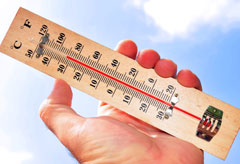Extreme temperatures could increase heart deaths
Experts warn about dangers of climate change as study shows extreme temperatures increase heart-related deaths


Experts warn about dangers of climate change as study shows extreme temperatures increase heart-related deaths
As extreme weather terrorises millions all over the world this week, experts are also warning us about the detrimental effect on our health posed by extreme temperatures.
Many more people could suffer from heart related problems as very cold and very warm weather puts a strain on their hearts.
A study in the British Medical Journal found that when the temperature dropped by just one degree Celsius in the UK, on a particular day, there were a further 200 heart attacks reported over the next month.
It is not entirely clear why the lower temperatures cause the sharp increase in heart attacks. Lab studies, however, have indicated that severe cooling could increase blood clotting, which could thicken the blood or increase blood pressure, leading to a possible heart attack.
Lead researcher Krishnan Bhaskaran, of the London School of Hygiene and Tropical Medicine, who worked on the study, suggested that it was the elderly and those with heart disease that were at the highest risk.
‘As it gets colder, think about limiting the time outside,’ he advised. He also suggested that those more vulnerable should wear suitable clothing and keep their homes properly heated.
Marie Claire Newsletter
Celebrity news, beauty, fashion advice, and fascinating features, delivered straight to your inbox!
However, tests revealed that those who took aspirin were less at risk. This is most likely due to the blood thinning properties of the medicine.
Heat waves, too, have been blamed for increases in heart related deaths but for entirely different reasons.
Not only do extreme high temperatures dehydrate us, but the heat also forces the heart to work much harder to get the blood to the skin for sweating.
This was seen in Paris during the summer of 2003 when 11,000 people died in the first half of August as temperatures soared to over 40C.
Climate change is certainly going to have a progressively negative impact on our health.
‘We can’t control the weather,’ Bhaskaran said. ‘But we can control our response to it,’ he added.
Ellen Mason, of the British Heart Foundation, reminds elderly people and those with heart conditions to ‘keep warm in their homes after the summer draws to a close.’
-
 I was told I was too girly to be gay — When will society stop judging women on how we look?
I was told I was too girly to be gay — When will society stop judging women on how we look?Why femme invisibility is a feminist issue
By Roxy Bourdillon
-
 Walking workouts are the hottest form of exercise RN - 5 best walking workouts for beginners to boost fitness and mood
Walking workouts are the hottest form of exercise RN - 5 best walking workouts for beginners to boost fitness and moodYour ultimate guide.
By Katie Sims
-
 I have no time to be faffing with brushes, but a make-up sponge is an essential in my routine—here are the 6 best
I have no time to be faffing with brushes, but a make-up sponge is an essential in my routine—here are the 6 bestEssential for smooth, seamless skin
By Mica Ricketts